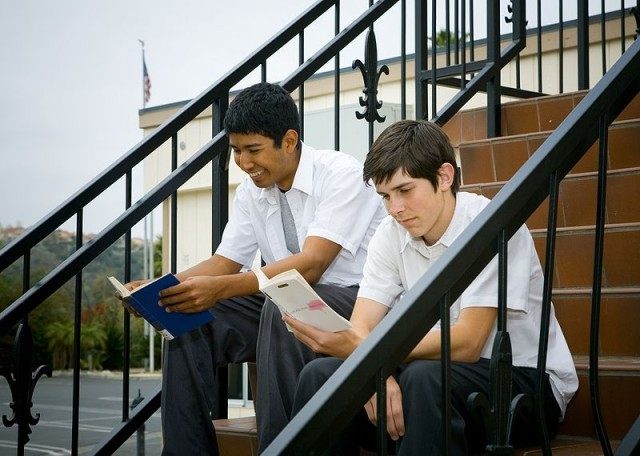In Dallas County, the Highland Park Independent School District (ISD) has been engaged in a battle over the high school English literature books that began back in September, ironically during National Banned Books Week. At issue were seven novels that parents had objections to their content which, by December, seemed to have been sorted out and things simmered down. However, at the January 20 school board meeting, tempers flared right back up in a big way over one re-approved novel and a previously suspended nonfiction title.
The re-challenged The Art of Racing in the Rain is a novel that is told through a dog’s point-of-view, which Breitbart Texas reported. A 12-person committee of parents, teachers and administrators was formed in response to the dissension over the book, resulting in a vote that reinstated the Garth Stein novel. It was being taught in English II. Parents were still able to appeal that decision. Someone did.
The Working Poor: Invisible in America by David K. Shipler chronicles various individuals living just above the poverty line. It was reconsidered after being removed from the reading list earlier this year. However, it included explicit sexual content in one of its chapters, which was among the contentions one parent raised in lodging this latest complaint against the nonfiction offering. In a formal written grievance, the parent questioned if this was even considered appropriate reading for a literature class given its heavy-handed equity-driven agenda reminiscent of a political science course.
Breitbart Texas spoke to Helen Williams, Director of Communications for the district, who clarified that when The Art of Racing in the Rain was challenged, its use was upheld by a reconsideration committee specifically made up of five district parents, two Highland Park High School (HPHS) teachers, a librarian, an instructional technology/library services coordinator, a lead counselor, and two high school students.
“The parent who challenged the book is appealing the committee’s decision. The process has three levels of appeal. Under board policy, the first level of appeal is to the appropriate administrator, which in this case is the high school principal. The principal upheld the decision of the reconsideration committee. The parent is taking the appeal to level 2, which will be heard by the superintendent or designee, per board policy. That appeal has not yet been completed. If the challenge were to go to level 3, it would be heard by the school board, “said Williams.
As for The Working Poor: Invisible in America, Highland Park ISD Superintendent Dr. Dawson Orr fleshed out a few proposed policy revisions to the board to further remedy the reading selection and complaint process, also according to Williams.
Park Cities People encapsulated a few possible new rules to include that texts are “evaluated as a whole and selected for their strengths rather than rejected for their weaknesses,” but that the texts “shall not contain excessive or gratuitous explicit sexuality or excessive or gratuitous graphic violence.”
Another suggested procedure for multiple complaints on a book included adding high school upper classmen on the reconsideration committee who had been taught the material.
HPHS principal Walter Kelley also reviewed a new process for annual literature selection process for teachers to work as a team in presenting possible novels to a review committee that would have the option to accept or reject books or or send them to a community feedback group, noted Park Cities People.
Williams told Breitbart Texas that the school board was supportive of the literature selection procedures that Kelly presented and they will go into effect immediately. This semester, teachers are considering selections, meeting as a team and as a department; they will submit their suggestions for literature selections for the 2015-16 school year by February 28th.
Further changes will require a board vote said Williams. For now, the Board of Trustees will take time for a “thoughtful review” of revisions and to consider the feedback from citizens representing varying points of view at the meeting.
Williams told Breitbart Texas that teachers will continue to have the freedom to propose new literature for use in the classroom. Once a literary work is proposed for consideration, the English Department and the HPHS Literature Review Committee will review the proposal and will evaluate the work based on its merits and on how it meets the instructional objectives that are specified for the particular course.
Parents on both sides of the book debate expressed their concerns, according to Park Cities People:
“The selection process needs to be taken out of the hands of the individuals who want to uphold the current status quo,” said Highland Park parent Tavia Hunt, who served on the reconsideration committee for The Art of Racing of the Rain.
“Parent involvement must bring value to the education process,” another parent added.
CBS DFW reported that parent Amy Peck argued for students’ rights to read the book. “In order to achieve diversity of thought, you need to have empathy,”she said. “Often, books are a gateway to those outside world experiences, teaching our children to empathize.”
The district has made some progress toward resolution by developing policies and processes that address the concerns that were brought to light. Still, the English literature reading list will continue to straddle a narrow ethical line within a community that must somehow hear out all its voices yet weigh good conscience to find a middle ground and define what is appropriate high school reading materials without one side crying censorship and the other, questioning judgment and values.
Highland Park school board members have a lot to wade through in the continuing controversy.
Follow Merrill Hope, an original member of the Breitbart Texas team, on Twitter @OutOfTheBoxMom.

COMMENTS
Please let us know if you're having issues with commenting.